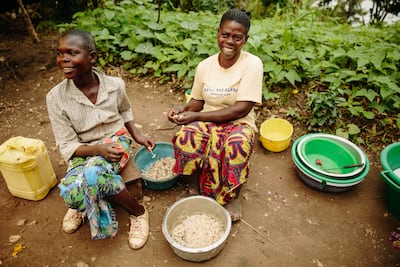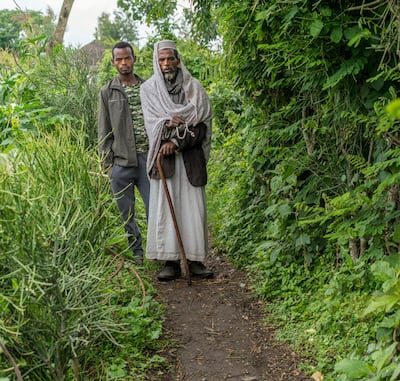A major donation to a UAE fundraising initiative will change the lives of thousands of world’s most vulnerable people.
The Reach Campaign, which was launched in February last year, focuses on neglected tropical diseases, which are little known in the wider world but devastating for sufferers.
The initiative seeks to eliminate two of the worst – river blindness and lymphatic filariasis – both of which are caused by parasitic worms carried by flying insects.
More than 200 million people globally require treatment for river blindness – one of the leading causes of preventable blindness, while about 850 million people are at risk of lymphatic filariasis.
So far, the campaign has received more than Dh2.8 million ($762,000), helping more than 14 million people in seven countries.
The goal of the fund is to carry out as many preventive measures and interventions where needed so the next generation can live free from disease.
Reach Campaign
Recently, the Reach Campaign received a donation of Dh367,250 ($100,000) from global development company Globesight.
The donation could be used to protect 200,000 people from contracting river blindness and lymphatic filariasis for a full year. Alternatively, it could also be used to protect 3,000 people from contracting the two neglected tropical diseases (NTDs) for life.
“NTDs affect about 1.5 billion people worldwide. These diseases are not only preventable, but eliminating them will have widespread benefits among communities,” said Nassar Al Mubarak, managing director of the Reach Campaign.
“Often, the children of adults who have contracted one of the diseases will have to drop out of school to become primary caregivers, impacting the entire family and trapping families in a cycle of poverty.
“Our hope is that through eliminating them, we can empower some of the most vulnerable communities to live a healthier and more productive life.”

Funds raised by the Reach Campaign are administered by the Reach the Last Mile Fund (RLMF), a 10-year, $100 million (Dh367.3 million) initiative established in 2017 by Sheikh Mohamed bin Zayed, Crown Prince of Abu Dhabi and Deputy Supreme Commander of the Armed Forces, along with other supporters, including The Bill & Melinda Gates Foundation.
It offers treatment and preventive measures in countries across Africa and the Middle East and invests in disease mapping, supports advanced lab facilities and cross-border collaborations.
In 2018, more than 13.5 million treatments for lymphatic filariasis and river blindness were delivered through the fund, and 76,000 healthcare workers were trained to help expand treatment and outreach.
The RLMF is managed by the End Fund, a philanthropic investment platform focused on tackling the five most common NTDs.
The End Fund produced a number of videos to highlight the stories of those who have received treatment-support from the RLMF and how it has changed their lives.
Fund provides much-needed treatment

Toyota Mkisyura, a farmer from Democratic Republic of the Congo, contracted lymphatic filariasis – a parasitic infection transmitted by mosquitoes – and developed elephantiasis, which causes the limbs to permanently swell.
“I’ve grown up with this illness, and it continues to ravage my feet,” the mother of five said in the video.
“The burning in my body grows; as the heat gets worse, the pain gets worse.”
She sells doughnuts for a living and engages in farming, but the disease has limited her opportunities to sell her produce because of other vendors at the market.
“They’d discourage me by saying the flies that land on my sores would also touch the sugar, and this could infect other people,” she said.
“They found ways to keep me out of the market.
“I still sell on my land, but I don’t make as much profit as I used to.”
Through the End Fund, Ms Mkisyura was provided with a treatment known as morbidity management, which gives patients relief from the disease and reduces progression through simple measures of hygiene, skin care, exercises and elevation of affected limbs.

Kasech Fantu, who lives in Sankura, Ethiopia with her two children, also suffers from elephantiasis and has benefited from the fund's assistance.
“When you see it [my leg] now it looks OK, right?” she said as she rubbed her swollen foot and ankle with some water.
“But there are times when it gets very swollen, it prevents me from going outside so people can’t see me; I just stay indoors sleeping on my mattress.
“When I do go outside, the people ostracise me, and I get embarrassed to go out in public to even shop.”
When Ms Fantu went to see health professionals from the fund, she was given some ointment and a bandage to cover her leg, and advised to do physical exercise.
Despite her physical pain, Ms Fantu said she is happy.
"If a person is happy, everything else is there. I speak well, I laugh, I weep, and I enjoy myself. Thank God I am still happy."

Lelamo Mukhtar, an Ethiopian farmer from Sankura, said when he was young he used to work hard on his farm, before he became sick with lymphatic filariasis.
“God gave me land, money and children, but now I am unable to even take care of my children,” said the father of 10.
Mr Mukhtar's son Fouwad has taken over the responsibility of supporting the family and dropped out of school to work.
“I pray that my children live a good life and that they stay healthy, because even if they are poor, they can work and survive,” Mr Mukhtar said.
“They can go to school and end up having a good life. In order to do all of that, health is the most important. Health comes first and is the most important thing.”
Mr Mukhtar was also provided with “much-needed treatment” by RLMF.
Last mile is always the most difficult

The Reach Campaign, the End Fund and RLMF support efforts to combat river blindness by capturing insects that cause it, especially the blackfly.
The disease can lead to blindness and painful skin infections for 205 million people worldwide who are at risk.
Moce, a Malian grandfather, contracted river blindness more than 30 years ago.
“The doctors showed me the microbe. It looked like the eyelash,” he said.
“It has been a while since I was diagnosed with oncho [oonchocerciasis]. I was given medicines that actually caused my feet to swell,” Moce said.
“I returned to the doctors to receive some more medicine to reduce the side effects. The doctors found something that they operated, but it did not help.”
He is now given onchocerciasis treatment every year.
The captured blackflies are sent to a lab to be tested for the presence of the parasite that causes river blindness.
“In West Africa, before the control activity started, there were more than half a million infected, and about 250,000 blind because of onchocerciasis,” said Prof Daniel Boakye, a senior technical programme adviser at the End Fund.
“For you to get the disease, you have to be exposed to a lot of bites. Most of the people are either farmers or fishermen who are exposed to these bites.
“With all that has been done for about 40 years to eliminate river blindness, reaching the last mile is always the most difficult part.”
He said in many places, the disease has been controlled as a public health problem.
“You go to these communities, and you don’t see little children leading the blind, but rather going to school.
“So it’s rewarding to know that you’ve been part of something that has been taking away misery from a lot of people.”









